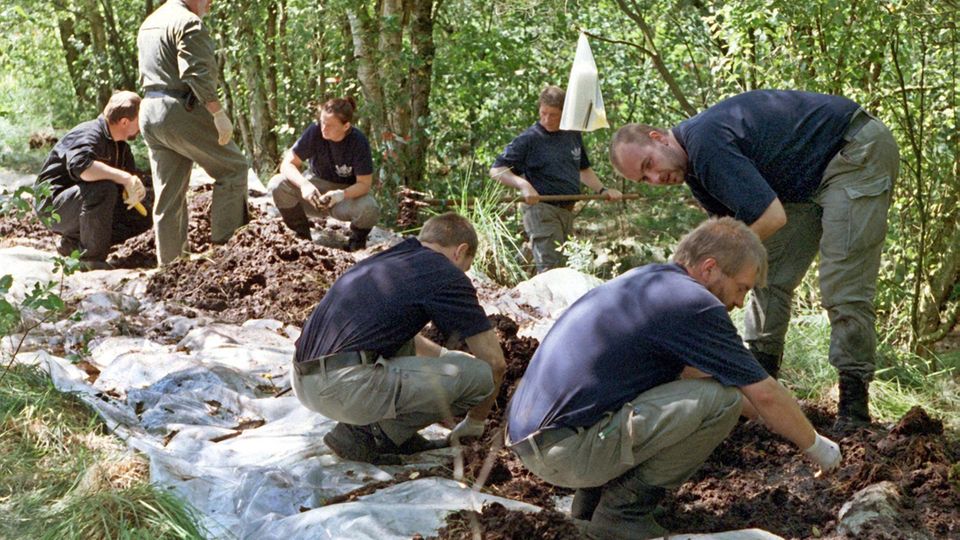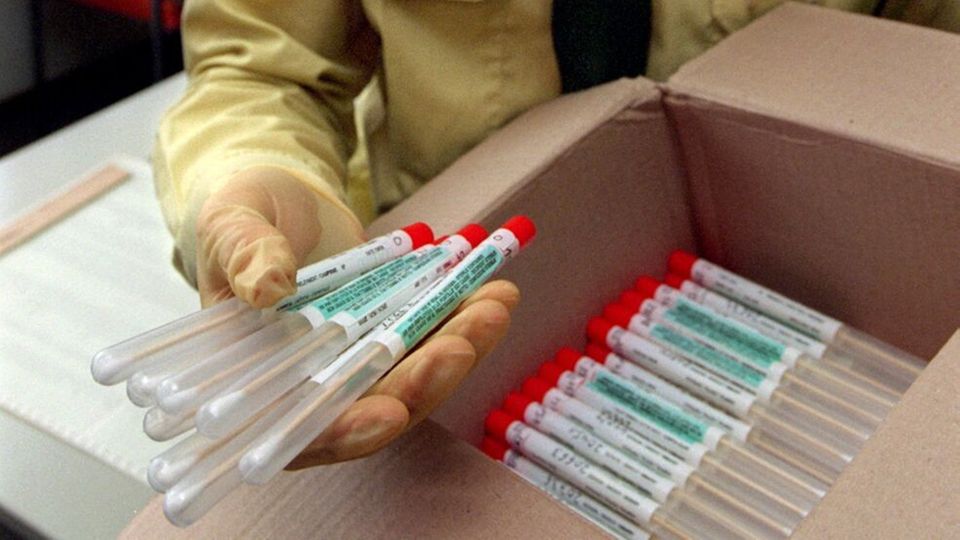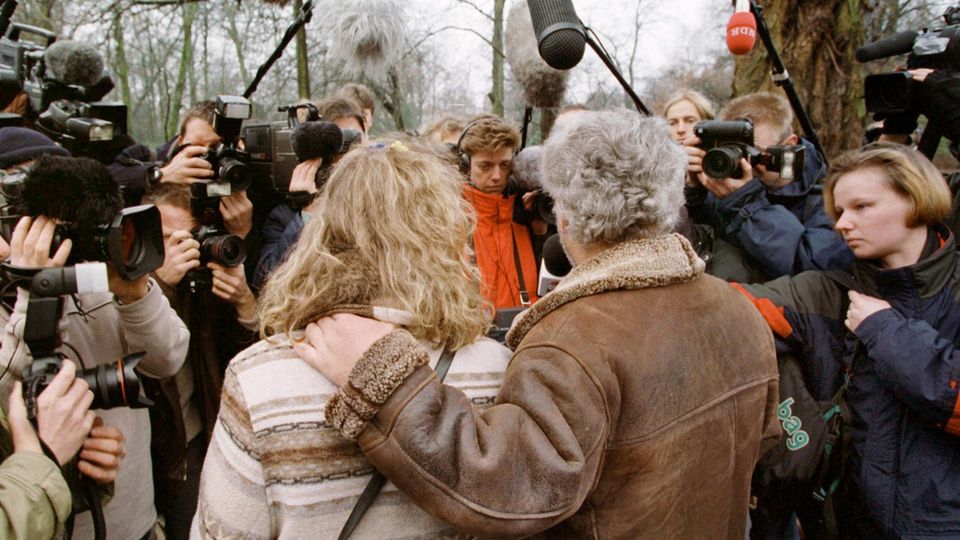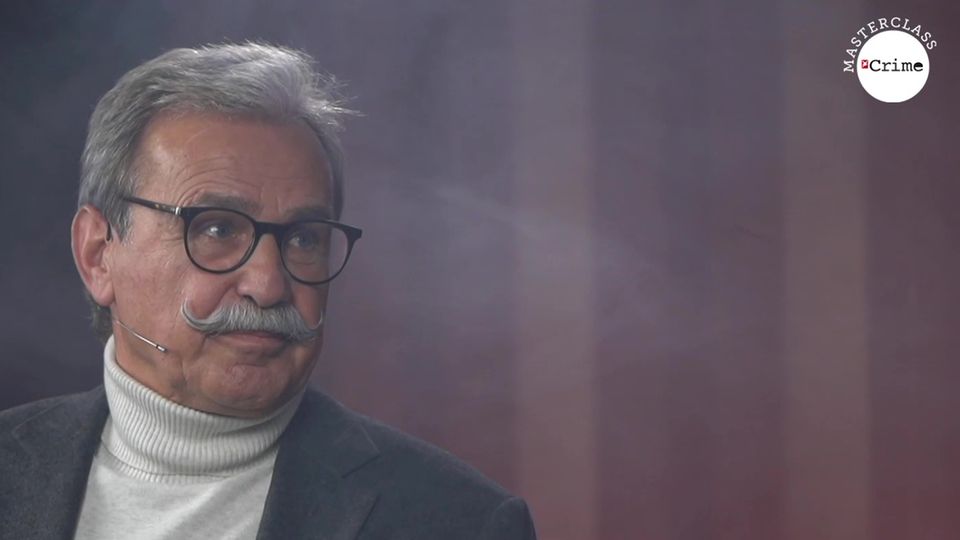On April 9, 1998, the world’s largest mass genetic test to date was carried out in Germany. More than 16,000 men voluntarily provided a saliva sample. One of them was subsequently convicted of murdering girls.
“Nelly”, as Christina N. is also called, spends the afternoon of March 16, 1998 in the swimming pool with her friends. She cycles home to Strücklingen in Lower Saxony, which is almost three kilometers long. It’s just before 7 p.m. The eleven-year-old agreed with her parents that she would be home at 7:30 p.m. When she is still not there at 8 p.m., her parents become worried. Shortly afterwards, her father drives the route by car and finds his daughter’s bike halfway to the swimming pool. The police assume a crime. Hundreds of rescue workers are combing the area. Factories and companies also give their employees time off to help find the little girl.
What no one suspects at the time: her murderer, Ronny Rieken, lives only four kilometers away. The 30-year-old trained mechanical engineer lives in a red brick house with his wife and three children in the town of Elisabethfehn. Since his youth he has been fighting, scaring girls and breaking cars. He was regularly beaten by his mother, an alcoholic. He has a relevant criminal record. In 1989, the Oldenburg regional court sentenced him to five and a half years in prison for raping his 19-year-old sister. Rieken was 21 years old at the time. He was released after serving two-thirds of the sentence. A psychiatric report in the rape trial found no evidence of sexual assault. The expert only found behavioral problems and occasional alcohol abuse. The social prognosis for early release was good after good conduct in prison and Rieken’s progress in vocational training.
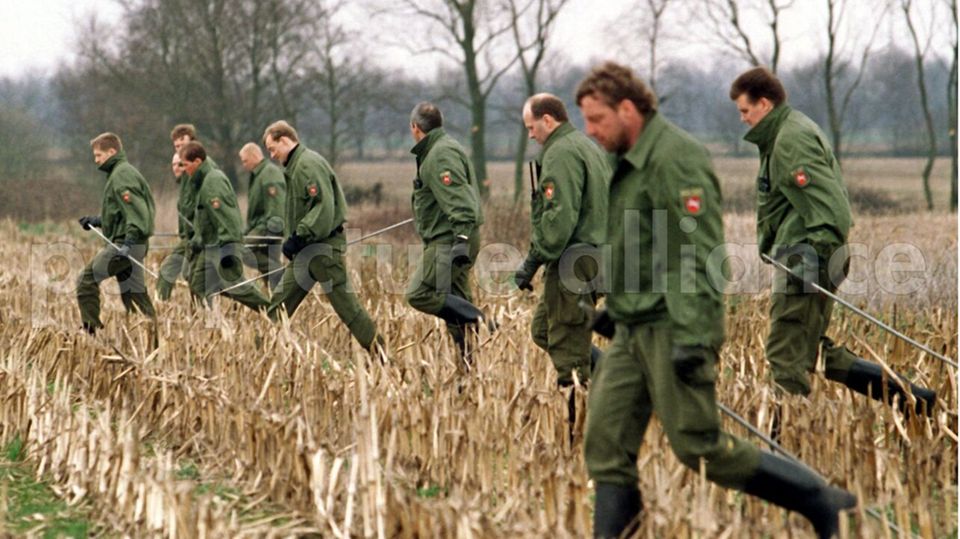
The police searched for days for the missing eleven-year-old Christina N.
© Ingo Wagner / Picture Alliance
Later he stays afloat with temporary jobs. Even when he doesn’t have work, he keeps up appearances in front of his wife and leaves the house in the morning – to hang around. And to look for new victims.
The police had been looking for the missing “Nelly” for three days when they found her backpack on the coastal canal. Another three days later, on March 21, 1998, hunters finally found her body in a forest near Lorup in the Emsland district – around 20 kilometers from her home. The body is only partially covered with branches. Her entire body is covered with hematomas. An autopsy revealed that the girl was raped six times and then strangled. The perpetrator then stabbed her 17 more times with a knife.
Ronny Rieken had previously abused a girl
The gruesome murder shocked the entire nation. Six-figure rewards are being offered for information that leads to the capture of the perpetrator. Two years before “Nelly’s” murder, her murderer Ronny Rieken had already attacked and sexually abused a girl from the neighboring town of Neuscharrel. The then nine-year-old was riding her bike to school when he dragged her into the trunk. He then let her go. Rieken’s wife was five months pregnant at the time.
On July 22, 1998, officials searched for remains of the victim’s clothing and other traces at the site where Ulrike E.’s body was found in Ipweger Moor (Ammerland district) near Oldenburg
© Ingo Wagner / Picture Alliance
The police secured DNA traces at the time, which they are now comparing with those of Christina N.. Now it’s clear: it’s the same man. The special “Nelly” commission created a profile of the perpetrators. Accordingly, he is a serial offender, under 30 years old and lives in the area. The investigators are now also linking him to the disappearance of Ulrike E. from Jeddeloh. The 13-year-old has been missing for two years. On June 11, 1996, she disappeared without a trace in Habern during a pony-drawn excursion. The place is around 30 kilometers from Rieken’s home.
In order to convict the perpetrator, the officials are relying on a new but legally controversial procedure: genetic screening. To the world’s largest up to that point More than 16,000 men between the ages of 18 and 30 from twelve communities in the Cloppenburg region are called upon to take part voluntarily in the mass genetic test. The DNA mass test starts on Maundy Thursday, April 9th. The police take a swab from the oral mucosa of each of the men. In this way, “epithelial cells” are obtained from which molecular geneticists can isolate the genetic fingerprint and compare it with that of the murderer. You cannot force men to take the test. The police have no legal basis for this. Politics and the judiciary turn a blind eye.
Saliva sample confirms Ronny Rieken as the murderer
Ronny Rieken also sets off for the test together with relatives. The 30-year-old wants to save face – and has no excuse. The evaluation of the saliva samples takes 50 days. Then it is clear: The sample with the number 3889 matches the traces left by the perpetrator at the crime scene. Ronny Rieken is the first criminal in Germany to be convicted using a mass DNA test. When the officers came to arrest him on the Friday before Pentecost, he was mowing the lawn. “The only reason I did that lawn mowing was because I didn’t want the lawn to look so shabby when all the press and everything showed up,” he said later in an interview.
More than 16,000 men had to provide a saliva sample on April 9th and 10th
© Ingo Wagner / Picture Alliance
It takes some time, but Rieken finally admits to Ulrike E.’s murder. He leads the investigators to a moorland where he buried her body. Rieken had pulled the girl from the coach seat by her hair, raped her and killed her. Her bones can only be identified by the braces.
During the interrogation with the police, Rieken finally confessed to raping the nine-year-old from Neuscharrel and an eight-year-old girl. He also admits to preparing several similar crimes against girls in the past five years and subsequently confesses to the rape of a 15-year-old in 1987.
The parents of the murdered Christina N. answered questions from journalists in front of the Oldenburg regional court
© Ingo Wagner / Picture Alliance
The trial against Rieken only lasts six days. On November 27, 1998, he was sentenced to life imprisonment and the particular gravity of his guilt was determined. This time, experts made a clear diagnosis: Rieken cannot be treated. He couldn’t understand other people’s feelings. He has a tendency to commit serious aggressive acts and must be considered at risk of reoffending. Rieken murdered insidiously, deliberately and with clear consciousness in order to cover up the rape of the two children, according to the judge at the time, who emphasized that an actual lifelong prison sentence would be appropriate atonement for his actions. Positive approaches on the part of the defendant – such as a willingness to confess and help solve the crimes after the arrest – could not change the guilty verdict.
15 years later, in 2013, the Lüneburg Regional Court decided on early release from prison and set a minimum prison term of 23 years due to the severity of the guilt. In February 2021, Rieken, who has since changed his last name, applied for early release from prison. This is rejected by the Lüneburg Regional Court. The judges come to the conclusion that he still poses a danger. Rieken remains in custody in the Celle correctional facility for the time being. To date he has not submitted any further applications.
Watch the video: Jürgen Schmidt is the former head of the Gifhorn criminal investigation department and gave detailed information about his job in the STERN CRIME Masterclass. In the recordings, Schmidt reports on everyday life at the police department and explains the police’s actions at the crime scene in theory and using two case studies.
Sources: ARD“Northwest Newspaper“, DPA archive, stern archive


